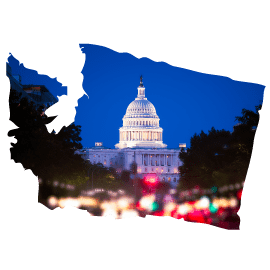Middle School Content Knowledge: Washington
Secondary Teacher Preparation Policy
Analysis of Washington's policies
Content Test Requirements: Washington offers a middle grades certification to teach grades 4-9. Candidates for the middle-level endorsement are required to take subject-specific assessments, which include middle-level humanities, mathematics and science.
In addition, the humanities test for middle school certification combines both English language arts and reading with social studies, without requiring individual cut-scores. Although the state's code no longer provides a link to the endorsement-related assignment table, it is unclear whether Washington has strengthened its policy by no longer allowing secondary teachers to teach single subjects in middle school, such as general math, pre-algebra and algebra, without additional requisite knowledge requirements.
Academic Requirements:
Washington does not explicitly require a major or minor in the subject areas that prospective middle school teachers plan to teach.
Middle School Licensure Deficiencies: Unfortunately, Washington offers a generalist K-8 license. Because middle school licensure deficiencies are scored in 3-B: Middle School Licensure Deficiencies, it is not considered as part of the score for the Middle School Content Knowledge goal.
Recommendations for Washington
Require content testing in all core areas.
Washington should require single-subject tests for all middle school teacher candidates in every core academic area they intend to teach as a condition of initial licensure. The state should set its passing scores to reflect high levels of performance to ensure meaningful middle school content tests. Washington should also address any deficiencies that undermine this policy (see Goal 3-B: Middle School Licensure Deficiencies analysis and recommendations).
Middle school teachers licensed to teach multiple subjects should earn two subject-matter minors.
Washington should encourage middle school teachers licensed to teach multiple subjects to earn two subject-matter minors. This would allow candidates to gain sufficient knowledge to pass state licensing tests, and it would increase schools' staffing flexibility.
State response to our analysis
Washington stated that it requires all teacher candidates who plan to teach in middle schools to pass WEST-E tests in their subject areas in order to be certified in the same area.
Updated: December 2017
Select another topic
General Teacher Preparation
- Program Entry
- Teacher Shortages and Surpluses
- Program Performance Measures
- Program Reporting Requirements
- Student Teaching/Clinical Practice
- Teaching Methods
Elementary Teacher Preparation
Secondary Teacher Preparation
- Middle School Content Knowledge
- Middle School Licensure Deficiencies
- Adolescent Literacy
- Secondary Content Knowledge
- Secondary Licensure Deficiencies
Special Education Teacher Preparation
Alternate Routes
Hiring
- Requirements for Out-of-State Teachers
- Provisional and Emergency Licensure
- Licensure for Substitute Teachers
- Supporting New Teachers
Teacher and Principal Evaluation
Teacher Compensation
Retaining Effective Teachers
Early Childhood Preparation
How we graded
3A: Middle School Content Knowledge
- Content Tests: The state should require that all new middle school teachers pass a separately scored subject-matter test in every core academic area for which they are licensed to teach.
The total goal score is earned based on the following:
- Full credit: The state can earn full credit if it offers a middle school license and requires teachers to pass a licensing test in every core academic area in which they are licensed to teach.
- One-quarter credit: In some cases, a state can earn one-quarter of a credit for mitigating the negative aspects of a K-8 license, for example, requiring a single subject test to teach that subject at the middle school level.
- 0/0 credit: The state will not earn any credit if it only offers a K-8 license and only requires an elementary content test.
Research rationale
Middle school grades are critical years of schooling. It is in these years that far too many students fall through the cracks. However, requirements for the preparation and licensure of middle school teachers can be especially problematic. States need to distinguish the knowledge and skills needed by middle school teachers from those needed by an elementary teacher. Whether teaching a single subject in a departmentalized setting or teaching multiple subjects in a self-contained setting, middle school teachers must be able to teach significantly more advanced content than elementary teachers. In order to do so, middle school teachers must be deeply knowledgeable about every subject they will be licensed to teach, and able to pass a licensing test in every core subject to demonstrate this knowledge.[1] The notion that someone should be identically prepared to teach first grade or eighth grade mathematics seems ridiculous, but states that license teachers on a K-8 generalist certificate essentially endorse this idea.
[1] For additional research on the importance of subject matter knowledge, see: Dee, T. S., & Cohodes, S. R. (2008). Out-of-field teachers and student achievement: Evidence from matched-pairs comparisons. Public Finance Review, 36(1), 7-32.; Chaney, B. (1995). Student outcomes and the professional preparation of eighth-grade teachers in science and mathematics. NSF/NELS: 88 Teacher Transcript Analysis. Retrieved from http://eric.ed.gov/?id=ED389530; Weglinsky, H. (2000). How teaching matters: Bringing the classroom back into discussions of teacher quality (Policy Information Center report). Princeton, NJ: Educational Testing Service. Retrieved from http://www.ets.org/Media/Research/pdf/PICTEAMAT.pdf ; A report published by the National Mathematics Advisory Panel (NMAP) concludes that a teacher's knowledge of math makes a difference in student achievement. National Mathematics Advisory Panel. (2008). Foundations for success: The final report of the National Mathematics Advisory Panel. US Department of Education. Retrieved from http://www2.ed.gov/about/bdscomm/list/mathpanel/report/final-report.pdf

